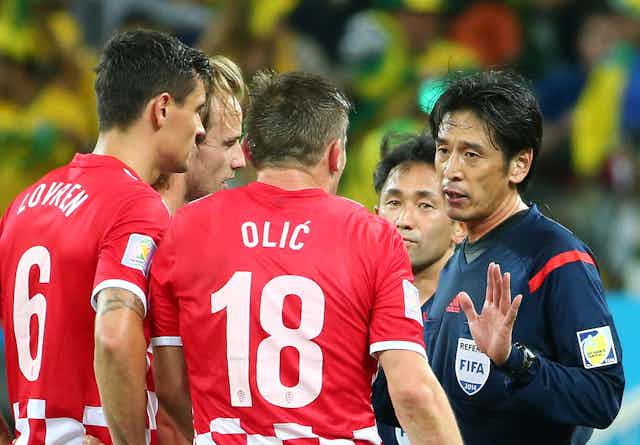From the perspective of fairness, the 2014 World Cup has been off to a remarkably bad start.
The opening game included at least two highly questionable decisions by the referee. First, the very generous penalty kick awarded in Brazil’s favour, and then Croatia had a goal disallowed on equally weak grounds.
The second game saw Mexico miss out on two goals due to controversial decisions by the referees, and in the game between Spain and the Netherlands, it was again the case that a penalty kick was awarded on very weak grounds.
The performance of the referees has been met with strong, and unusually universal, criticism. Commenting on the penalty situation that saw Brazil equalise in the opening game, Peter Fröjdfeldt – a former UEFA referee – observed that:
He [Nishimura, the referee] was well placed and he looked very convinced when he blew the whistle. But I do not think he is equally convinced when he gets to see the situation again.
In this, I think we can perceive a hint at where we will find the solution to the problem plaguing this World Cup, as it has in the past as well. The solution is, of course, the adoption of technologies such as replay footage for the referees.
As pointed out by Keith Lyons, we have already seen the positive effect of the goal line technology in the match between France and Honduras (see the video below).
Taking this to its logical extension – that is, the use of technology to ensure correct decisions by the referees – we may well picture a future where referees are wearing Google Glass (or a similar product from some other provider – FIFA Glass perhaps?).
After all, the calls for referees to get glasses, or get stronger glasses, are commonly chanted at football arenas. Such a tool could indicate offsides in real-time, and could be used to provide the referees with instant multi-angle replays of controversial situations.
Opponents of the use of cameras will say that such technologies take away the soul of the game. But let’s think back to the game between Italy and Australia at the 2006 World Cup. Italy was awarded a completely unfair penalty kick resulting in Australia’s premature departure from that tournament.
I wonder how many Australians took a sigh of relief when seeing the “soul of the game” being preserved on that occasion.
Enter legal philosophy
One of the central debates in legal philosophy has been focused on so-called “judicial discretion” – to what extent do, and should, judges enjoy discretion in the judgements they make?
Most non-lawyers would probably be surprised at any suggestion that judges exercise discretion in deciding cases. But even though there probably is not a single matter legal philosophers agree upon universally, there is widespread recognition that judges do exercise such discretion.

One way of explaining the sources of this discretion goes like this: the facts of a case may be impossible to ascertain with 100% certainty (for example, is a particular witness telling the truth?) and some laws are intentionally, or unintentionally, vague (advertisement is not allowed to be misleading, but what does it take for it to be classed as misleading?).
Consequently, there is not always just one way in which to interpret the facts and/or the law, and the judge must exercise a degree of discretion and chose amongst several possible ways in which to decide the case.
Some will see the judges’ discretion to interpret vague laws as beneficial in that it may advance the legal system, but few would argue that there are any benefits stemming from the impossibility of, for example, ascertaining whether a witness is lying or not.
And here, sports such as football enjoy two important advantages over the legal system:
- The rules of football are not vague and open to interpretation in the way many legal rules are
- Football games take place in predetermined locations at which it is reasonable to install advanced surveillance equipment monitoring the game. In sports, we can use technology to find the correct facts to a greater extent than we can in society in general.
Maybe it is the case that both our judges and our referees are enjoying too much discretion? Perhaps paradoxically, it may be the case that we have to accept that judges exercise discretion, but maybe we can do more to limit the discretion enjoyed by the World Cup referees. And it is here the cameras and other technology come into the picture.
Some will say that cameras do not change the level of discretion; it only leaves the referees with a more informed discretion.
I think that is wrong. The level of discretion is to a great extent depending on our expectations of the referees and if they have the benefit of helpful technologies our expectations can be raised and the referees will hopefully rise to the challenge.
A lot, including national pride and huge amounts of money, is at stake at an event such as the World Cup. It then seems a bit odd that we are not more careful to make sure that the decisions by the referees – decisions that are determinative – are based on facts.

